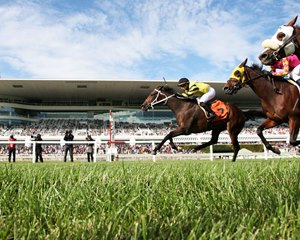Funding Issues Loom for Bears' Move to Arlington Site


The National Football League's Chicago Bears are opening a new chapter in negotiations to put a football stadium where horses were stabled and trained at the now-mothballed Arlington International Racecourse, suggesting that some form of public funding will be needed despite growing opposition.
With a vocal community group in Arlington Heights, Ill., pushing for a law that would ban financial support for a stadium, the Bears have scheduled an informational meeting Sept. 8 at a local high school. Preparing for that, the team released a statement sketching out plans for development.
Churchill Downs Inc., which owns the track, has a tentative agreement to sell the property to the Bears and is conducting an on-line auction disposing of the bits and pieces of its racing persona. Both parties have suggested a potential closing on the 326-acre property in 2023.
Whether or not the deal closes, the chances of Arlington ever reopening to host racing seem vanishingly remote as the facility is decommissioned and stripped. With Arlington closed since September 2021, Hawthorne Race Course is the only operating track in the Chicago area, currently shared by Thoroughbred and Standardbred racing.
The Bears said the project is "an ongoing work-in-progress: that could include, in addition to a stadium, "a multi-purpose entertainment, commercial/retail, and housing district that will provide considerable economic benefits to Cook County, the surrounding region and (the) State of Illinois."
The statement mentioned potential parks, open spaces, and "other improvements for the community to enjoy."
An artist's conception of a potential development shows a "stadium district" in the northwest corner of the property, near the intersection of Illinois 53 and Northwest Highway, where stables and the training track have stood for decades. A "mixed use development" is envisioned for the spot now occupied by the iconic, cantilevered-roof grandstand and the racing surfaces.

"We remain under contract to purchase the property," the Bears said in a statement released Sept. 6, "but there are conditions that must be met in order to be in a position to close.
"While the Bears will seek no public funding for direct stadium structure construction, given the broad, long-term public benefits of this project, we look forward to partnering with the various governmental bodies to secure additional funding and assistance needed to support the feasibility of the remainder of the development."
The statement touted statewide economic benefits and job creation and added, "We also anticipate that the development will generate $16 million in annual tax revenue in addition to property taxes for Arlington Heights, $9.8 million for Cook County, and $51.3 million for the State of Illinois."
The Bears have a long-term contract with the Chicago Park District, with buyout provisions, to play at Soldier Field on the Chicago lakefront. That facility is the smallest in the National Football League, which limits the Bears' ability to develop secondary revenue streams and precludes scheduling major events such as the Super Bowl, NCAA Final Four, and college football playoffs.
While Arlington Heights officials have welcomed the prospect of hosting the Bears, they have been cautious about the concept of any public funding for the project.

Americans for Prosperity, a conservative political advocacy group with a local chapter, is circulating petitions calling for a village ordinance that would prohibit "offering or extending any financial incentive to any business or corporation to operate in the village."
While they have shied away from any suggestion of public funding, Arlington Heights officials also have said the proposed ordinance would, in a more general way, handicap their ability to attract any new businesses.
State officials have expressed no interest in helping the Bears move or build.
